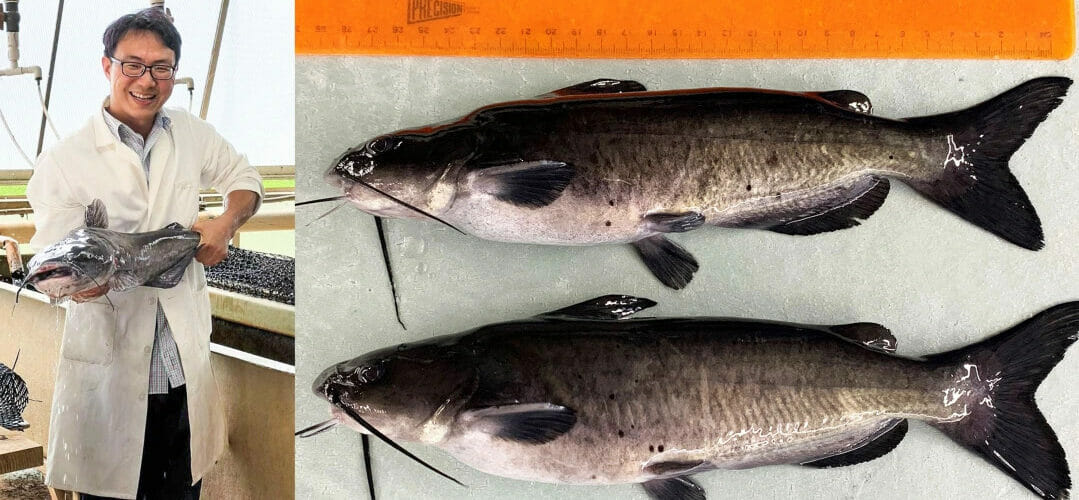The following report is by MIT Technology Review:
Millions of fish are farmed in the US every year, but many of them die from infections. In theory, genetically engineering fish with genes that protect them from disease could reduce waste and help limit the environmental impact of fish farming. A team of scientists have attempted to do just that—by inserting an alligator gene into the genomes of catfish.
Americans go through a lot of catfish. In 2021, catfish farms in the US produced 307 million pounds (139 million kilogram) of the fish. “On a per-pound basis, anywhere from 60 to 70% of US aquaculture is … catfish production,” says Rex Dunham, who works on the genetic improvement of catfish at Auburn University in Alabama.
But catfish farming is also a great breeding ground for infections. From the time farmed fish are newly hatched to the time they are harvested, around 40% of the animals worldwide die from various diseases, says Dunham.
Could the new genetic modification help?
The alligator gene, which Dunham’s research turned up as a potential answer, codes for a protein called cathelicidin. The protein is antimicrobial, says Dunham—it’s thought to help protect alligators from developing infections in the wounds they sustain during their aggressive fights with each other. Dunham wondered whether animals that have the gene artificially inserted into their genomes might be more resistant to diseases.
Dunham and his colleagues also wanted to go a step further and ensure that the resulting transgenic fish couldn’t reproduce. That’s because genetically modified animals have the potential to wreak havoc in the wild should they escape from farms, outcompeting their wild counterparts for food and habitat.
SEE: CRISPR Experiment Goes Wrong And Turns Fluffy Hamsters Into “Mutant Rage Monsters”
Transgenic Survivors
Dunham, Baofeng Su (also at Auburn University), and their colleagues used the gene-editing tool CRISPR to insert the alligator gene for cathelicidin into the part of the genome that codes for an important reproductive hormone, “to try to kill two birds with one stone,” says Dunham. Without the hormone, fish are unable to spawn.
The resulting fish do seem to be more resistant to infections. When the researchers put two different types of disease-causing bacteria in water tanks, they found that gene-edited fish were much more likely to survive than their counterparts that had not undergone gene editing. Depending on the infection, “the survival rate of the cathelicidin transgenic fish was between two- and five-fold higher,” says Dunham.
The transgenic fish are also sterile and can’t reproduce unless they are injected with reproductive hormones, say the researchers, who published their findings online at the preprint server bioRxiv. The paper has not yet been peer-reviewed.
“When I first [heard about the study], I thought: what on earth? Who would have thought to do this? And why would they?” says Greg Lutz at Louisiana State University, who has been researching the role of genetics in aquaculture for decades. But Lutz thinks the work has promise—disease resistance can have a big impact on the amount of waste generated by fish farms, and reducing this waste has long been a goal of gene editing in farmed animals, he says.
Farming fish that are resistant to disease will require fewer resources and produce less waste overall, he says. Though Lutz is positive about the research, he isn’t convinced that the CRISPR catfish represent the future of aquaculture. The gene-editing procedure used by the team is fiddly, and it would probably need to be done for each round of fish spawning for the hybrid catfish commonly used in fish farming. “It’s just too difficult to produce enough of these fish to get a viable, genetically healthy line going,” he says.
Ready to eat?
The Auburn scientists hope to eventually get their transgenic catfish approved so that it can be sold and eaten. But that could be a long process.
SEE: China ‘Reincarnates’ And Clones ‘Super Cows’ That Can Produce More Milk Than Normal
Only one other type of genetically engineered fish has received approval in the US. In 2021, AquAdvantage salmon finally entered the US market—26 years after the company behind the fish, AquaBounty, first applied for approval from the Food and Drug Administration. The salmon have an extra gene—taken from the genome of another type of salmon—that makes them grow much bigger than they otherwise would.
Suppose the catfish are eventually approved for sale. Would anyone eat them? Su and Dunham think so. Once the fish are cooked, the protein made by the alligator gene will lose its biological activity, so it is unlikely to have any consequences for the person eating the fish, says Su. At any rate, plenty of people already eat alligator meat, he adds. “I would eat it in a heartbeat,” says Dunham.
But Lutz points out that others might not be comfortable with the idea of eating a catfish with an alligator gene. “I’m sure you’ll have people that fully expect that catfish to have a big, long mouth with pointy teeth to bite them,” he says.
SEE: FDA Fast-Tracks Clearance For Gene-Edited CRISPR Cattle For Meat Consumption
AUTHOR COMMENTARY
“But catfish farming is also a great breeding ground for infections.” -Ever since the Covid sham more so than ever before, scientists and the media have increased their push to condemn farming and livestock handling as a “dirty” industry that are factories for plagues. Thus, it has now allowed scientists to come in and once again mess with God’s creation.
The irony of this however is that farm-raised fish are not as healthy as wild caught out in a pond or an unpolluted lake, and because of the industrialization of it all it most certainly will cause disease and sickness in the long term.
He that walketh uprightly walketh surely: but he that perverteth his ways shall be known.
Proverbs 10:9
[7] Who goeth a warfare any time at his own charges? who planteth a vineyard, and eateth not of the fruit thereof? or who feedeth a flock, and eateth not of the milk of the flock? [8] Say I these things as a man? or saith not the law the same also? [9] For it is written in the law of Moses, Thou shalt not muzzle the mouth of the ox that treadeth out the corn. Doth God take care for oxen? [10] Or saith he it altogether for our sakes? For our sakes, no doubt, this is written: that he that ploweth should plow in hope; and that he that thresheth in hope should be partaker of his hope. (1 Corinthians 9:7-10).
The WinePress needs your support! If God has laid it on your heart to want to contribute, please prayerfully consider donating to this ministry. If you cannot gift a monetary donation, then please donate your fervent prayers to keep this ministry going! Thank you and may God bless you.








They’re playing God, therefore it’s not gonna end well.
is it just me or are satans repetitive tricks getting old.
but isnt it hilarious that they cant create anything independant from God’s creation.
they’ve never created anything , just corrupted everything God made.
what’s next!? green rhinos & orange colored strawberries or maybe spotted zebras …. no wait, i got it …. flying pigs! renamed cherubs … lol
Haha you never know what man in his wicked, depraved mind will create and try to mimic of God’s creation, and you’re right, every time man does it, it’s never independent, it’s always corrupted.
What could go wrong? And as for ‘who would eat it’…..it’s not like they’re going to be open & honest or transparent about labeling it, I’m thinking. They already lie and lie and lie…’natural seasonings’…